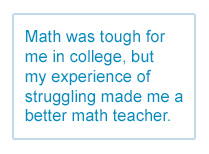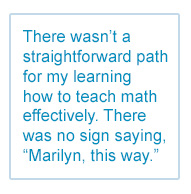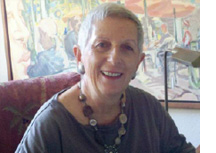I majored in math in college, and I remember my college professors as caring and kind. However, as they gave their lectures and filled the chalkboard, there was always a moment that triggered my downfall. A professor would say, nearing the end of an explanation or proof, “So you can now see that . . . ,” or “It’s now obvious that . . . ,” or “Because of this, it’s now clear that . . .” But for me, “now” rarely came. I often didn’t “see” what the professor saw; nothing was “obvious” to me; and little was “clear.” I received my math degree, but it was a struggle.
A professor would say, nearing the end of an explanation or proof, “So you can now see that . . . ,” or “It’s now obvious that . . . ,” or “Because of this, it’s now clear that . . .” But for me, “now” rarely came. I often didn’t “see” what the professor saw; nothing was “obvious” to me; and little was “clear.” I received my math degree, but it was a struggle.
Today I’m fine with the content of math through high school, but I still feel inadequate with much of what I studied in college. And while those experiences in college occurred more than 50 years ago, I can still conjure up the feeling of being an inadequate math student. In a way, I think that my feelings are similar to what some teachers I’ve talked with felt when sent to the chalkboard to do work in a math class in elementary school. The feelings run deep.
There’s an upside to this story. When I became a teacher, I made some promises to myself. I would never contribute to students in my math class feeling inadequate or demeaned by math. I would do all I could to help students build understanding of the math they were learning, as I had somehow built understanding successfully through high school math. I would never say things like, “So you can now see that . . . ,” or “It’s now obvious that . . . ,” or “Because of this, it’s now clear that . . .” I was going to be a different kind of teacher.
But what it meant to be a different kind of teacher wasn’t clear to me, and the journey to figure it out has been the main quest of my teaching career. In my beginning years of teaching,  when I taught eighth and ninth graders, I reverted to teaching the way I had been taught. I planned my lessons carefully, taught from the chalkboard, then circulated as students did assignments. Explaining was the only teaching method I had and a box of colored chalk was my main tool. My lessons worked for some students, as some lessons had worked for me when I was learning. But I was painfully aware that my lessons didn’t work for others. I realized that I was doing to some of my students just what my well-meaning math professors in college had done to me.
when I taught eighth and ninth graders, I reverted to teaching the way I had been taught. I planned my lessons carefully, taught from the chalkboard, then circulated as students did assignments. Explaining was the only teaching method I had and a box of colored chalk was my main tool. My lessons worked for some students, as some lessons had worked for me when I was learning. But I was painfully aware that my lessons didn’t work for others. I realized that I was doing to some of my students just what my well-meaning math professors in college had done to me.
That’s when I started my search for how to be a better math teacher. And that search took me in several directions: First I had to learn more about the math I was teaching—more about whole numbers, fractions, algebra, geometry. Yes, I had a strong math background, but I hadn’t thought enough about the why of math when I developed proficiency with skills and procedures. Also, I began working with students in earlier grades, fascinated by how younger children dealt with math to learn the basics. And, of course, I had to figure out how to establish and manage a classroom that gave students access to the mathematical content and also invited them to become mathematical learners.
There wasn’t a straightforward path for my learning. There was no sign saying, “Marilyn, this way.” I engaged with colleagues, learned from my students, took classes and workshops, attended conferences, and read many resources. My goal has been for students to be interested in math, to be curious about new math ideas, to be willing to take risks and plunge into solving new math problems, and also to see math as engaging and playful. I feel that my efforts have paid off. Most recently, in the two second grade classes I worked with last year, math was rated as the students’ favorite more than any other subject. The teachers and I were thrilled.
It’s in this spirit that I’ve decided to start a blog. I’m still on the journey of becoming a good math teacher, and I invite you to come along with me. I’m in classrooms regularly, so I plan to offer thoughts about teaching math, suggestions from my past and present classroom experiences, links to resources I’ve found useful, problems to solve that interest me, and more. I look forward to sharing my thoughts with you and hearing feedback as we travel together on this journey.


Studies such as TEDS-M correlated teachers with weak math ability perpetuating poor math education. So why are teachers who can barely pass PRAXIS and other math teacher exams still getting licensure, and why does that remain the low math hurdle to entering the classroom? And more absurdly, why are present and former teachers who struggle with math going around lecturing about math education and profiting off their own incompetence?
http://msutoday.msu.edu/news/2010/study-us-needs-better-trained-math-teachers-to-compete-globally/
In nations where students excel in math, the formula for success is straightforward: math teachers are selected from those who were strong in math and math education policy/curriculum is developed by committees of math teachers who are selected by their colleagues; in other words, teachers choose from among the strongest and most successful in their ranks to lead the way.
Congratulations on launching your blog, Marilyn. I look forward to upcoming posts.
Thanks, Marilyn, for venturing into blogging; it seems a friendly media. Younger colleagues read and communicate more with technology and less with printed material. You have said more than once you want to “Make the world a better place for children through math.” A blog enables your ideas to reach a broad audience. 2015 looks like a grand year!
Marilyn,
Delighted to hear you’re blogging. I look forward to reading and sharing them with my colleagues and teacher education students.
So glad you’ve started blogging! I look forward to your insights.
Marilyn, this is a wonderful idea. I’m certain you will receive great responses! Today I am a middle school sub and can relate to the teachers in this world!
I am also in the late stages of my career. I have taught middle school mathematics, been a system math coordinator, trained math elementary math coaches, and now consult with schools and systems as they work with teachers to develop a deeper understanding of math and learn new strategies to help their students understand math concepts. Yet, I to am still a learner. As students and teachers ask questions or explain their thinking, I often find myself revisiting something with renewed insight and learning. I hope I will always be a learner and not be afraid to say, “Wait a minute and let me think. That may be right, I just have not thought about it in that way before.”
I look forward to continued learning with you and other educators. May we inspire each other to spread the love of solving math puzzles and looking at new problems as an adventure in understanding.
Thank you so much for your blog. It so mirrors my own journey, although I was an elementary education major not a math major. I have learned so much from you by reading your books and using your materials in teacher trainings. It will be nice to hear from you more regularly so I can continue to learn to be a better math teacher!
Thank you for sharing your thoughts and insights. I am a building principal and we purchased Do the Math Kits with Title funding to assist with our children in need of Tier 2 or Tier 3 Interventions. We are currently addressing concerns in the data linked to a lack of understanding in Base 10 Numbers and Operations evident on our Iowa Assessments. If you have ideas or a quick way to focus even 10 minutes per day as children will not begin the preparation for this assessment administered in April, I would be open to your ideas in this specific domain. Even if you could suggest specific vocabulary and the meaning that could be beneficial, we use Math Vocabulary Journals as well. Thanks and Happy New Year!
Dear Ms. Burns,
Thank you so much for sharing how you worked and struggled to become a better math teacher. I have used your examples of how to teach math over the past 28 years I have been an elementary teacher. I have appreciated the lessons you have shared, your insight into how students learn, and your conversations with students. I have purchased many of your books and treasure them as models incorporating best teaching practices. All of these have been of tremendous help to me. As I have become a curriculum coach, I have tried to share with teachers your wisdom and knowledge about how students learn along with our responsibilities as teachers to be the most effective we can be. I appreciate the diligence you have maintained in helping us learn how to improve our mathematics teaching.
Vickie Brown, Curriculum Coach, SGT Roberto Ituarte, Socorro ISD, El Paso, Texas
Marilyn, your story resonates deeply with me. My story has many similarities. I am sure this is also the case for many in math education today. You were one of my first mentors as an elementary math teacher working to improve my mathematics teaching. In the 90s I read everything by Marilyn Burns and began the transformation of my teaching with your first replacement units and the K-8 Mathematics Teaching Resource book. I am so thankful for your contributions to math education and your continued inspiration to grow and learn as a math educator.
I am so excited that you are starting a blog!
I am thrilled that you have started a blog! Teachers are in need of mentors, valuable resources and ideas from beyond our schools. I am eager to hear more about your elementary school experiences. I find that the way we often teach math to young children is too formulaic and abstract. I struggle everyday with finding interesting, relevant and creative ways to explore math with children. While I feel that they need to be the “discoverers” of math concepts and that talking through their reasoning is crucial, I feel that I lack the expertise in creating these opportunities. Hooray for including us on your journey 🙂
Hi Marilyn, I’m thrilled that you be writing this blog. I’m anticipating and excited to be reading your ideas and thoughts. I’ll be in touch from time to time.
Cheers to you, Connie Cannon
Looking forward to thinking about the learning of math. If it makes sense then solving any problem is a matter of thinking not memorizing formulas. This should be a sweet adventure. Thanks for sharing. Will you try to address order of operations… always confusing..
I have used activities from your books and newsletters for more than 25 years. Though I think your philosophy is similar to that behind the standards, my concern now is adapting your lessons/ideas to the CCSS. Instead of sensing that my math instruction is moving forward as it has all these years, I feel like I’m floundering. I am interested in your comments on a cohesive approach to the math standards and how I can be confident that my instruction is doing them justice.
You may be interested in reading “Go Figure: Math and the Common Core,” an article I wrote for Educational Leadership
Marilyn –
I have been learning to be a better math teacher for years. I struggled in math growing up mostly because I had a different way of doing math and was always asked to do the teacher’s steps. As a beginning teacher I made math the shortest part of the day and unfortunately (and embarrassingly) probably passed on the hate of mathematics to many students.
Then, I was asked to only teach math – Who ME??? And in an effort to help students understand I began the journey of understanding myself. So I have learned to learn from students, colleagues and parents of students. The journey continues as I share in learning with teachers across the district where I work. One of my goals is to bring the FUN back in Mathematics. I too want students to “play” with math and enjoy it!!
Over the years, you have been part of that inspiration (since 1988) and I appreciate your effort at blogging! 🙂 Looking forward to future reading!!
I am eagerly looking forward to continuing the journey of making math make sense.
As I learn I teach, as I teach I learn and so the pattern continues.Thank you for helping me grow future mathematicians, regardless of their chosen fields.Your resources and strategies have been inspirational over the years-So glad a former math manager, here in Houston, introduced us to you years ago.Great to have you blogging.
Marlilyn,
Reading your blog was like listening to my own inner most thoughts. I too struggled in mathematics early on in the 60’s and 70’s, but majored in it in college. I have always loved mathematics, hence the major, but I never truly understood the “why” until after I became an elementary school teacher. Everything about it became so exciting and intriguing. I just can’t get enough of it now. I love listening to students’ mathematical thinking and helping them learn and understand in a way I never did. I, in fact, learn so much from my own students. When I get excited, they get excited and visa versa. Thank you for the blog. You are an inspiration!
You are truly an inspiration for all teachers! Thank you for starting a math blog that will surely have a huge following ensuring self-PD for us all! Looking forward to following your blogging journey – the future is wide, next thing there will be a Marilyn Burns tweet
I’m tweeting at @mburnsmath. Another learning curve.
So happy to see your blog is off to a great start! I will share it here at Town of Webb School, Old Forge, NY.
Thank you for starting this blog, Marilyn. I teach grade French Immersion. As if math wasn’t tough enough for some kids, imagine them learning it in a budding second language! I have always enjoyed math and I love teaching it but I have always focused on students who struggle and try hard to incorporate as many ways to teach concepts that will reach all the different learning styles kids have. I remember asking my grade 11 algebra teacher if I could stay after class for help in the lesson taught that day. He taught it in exactly the same way he did earlier that day. It didn’t help me at all. I want to offer different ways to teach to kids like me when they don’t “get” it the first time. It sounds like you experienced the close to the same thing and so I am sure I will enjoy and learn much from your blog. Helene
I’m excited about reading your blog! I have been inspired by your sample lessons and your work for years and love the teaching method!
it’s a nice post to get the knowledge .its very useful and informative article I have read this blog it’s very good kindly share some more blog like this I am waiting for your next article or blog
Best IIT JEE Maths Faculty In Kota
best maths teacher in kota,
best individual coaching for maths in kota
Thanks for the inspiration. Math is a discipline that is very useful nowadays because of the development in the field of computing. Math is for those who loves to solve problems and provide solutions to contribute for greater good.
Duyor Review and Tutorial Center
First of all ,thanks for sharing this article. you explained it very well and i learn so many things from this article. i wish you will post more article just like this one